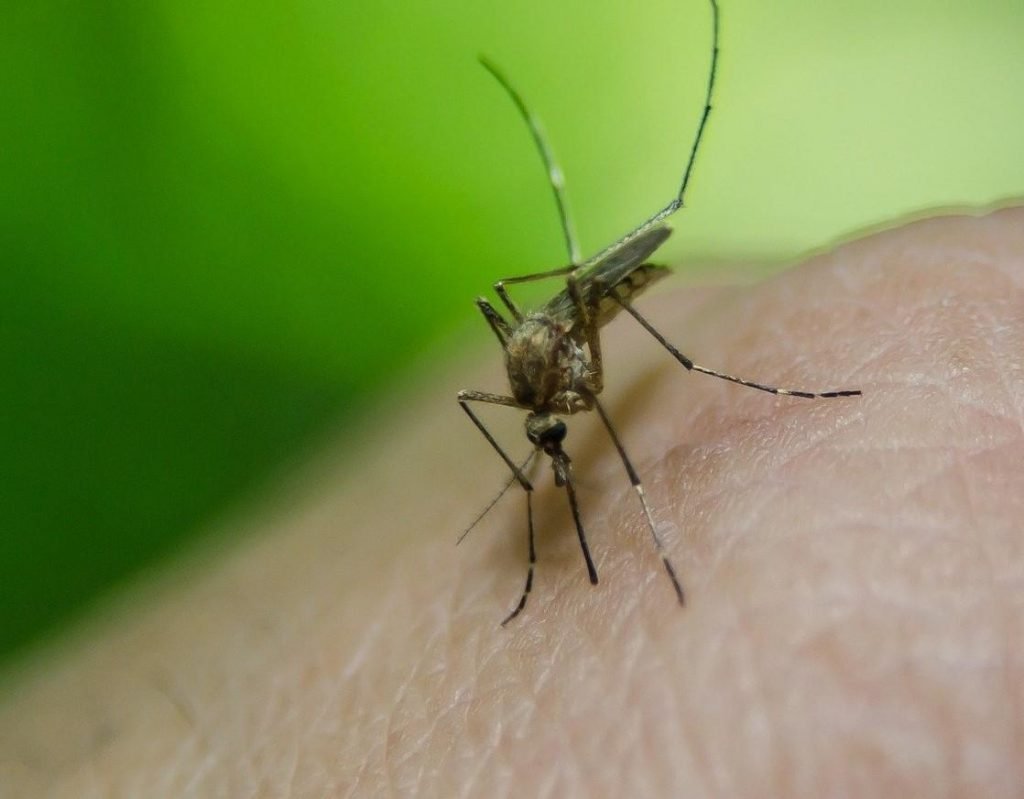Mosquitoes can, literally, be a pain when camping. Knowing what to do about mosquitoes when tent camping is essential knowledge to ensure you enjoy your trip no matter where in the US you are camping.
Dealing with mosquitoes falls into 3 interlocking approaches:
- Prevent them from getting access to you and your tent
- Keep them away by the use of repellent
- Knowing how to quickly and effectively treat the bites to reduce inflammation, pain and itching.
Just before getting started on describing these 3 strategies, let’s take a few minutes to make sure we understand what being bitten by a mosquito means
What is a Mosquito Bite
Only female mosquitoes bite. That’s an interesting fact but has absolutely nothing to do with how you deal with mosquitoes while camping.

Another interesting, but almost useless, fact is that mosquitoes don’t actually bite. Instead, they inject a long, thin, hollow tube called a proboscis into your skin. They then feed by allowing your blood to flow through this tube.
To stop the blood clotting, the mosquito injects saliva into your skin first. It is your body’s reaction to the saliva that leads to the characteristic red lumps which only appear a few hours after the bite.
For most of us, a single mosquito bite is little more than an irritant. They itch for a while but that’s about it. Sadly, it is unusual to get a single bite – you will usually get 3 or more from a single feeding session. In this case the itching can be intense and last, on and off, for several days.
For a few people mosquito bites are much more serious. Their bodies react much more strongly to the saliva and they get much more pronounced swelling, soreness and itching.
We met one young women who had had at least 20 bites on one arm overnight. Her arm swelled to a point where she couldn’t bend it. The pain was intense and she ended up hospitalized.
Such reactions are rare. Some people never seem to be bothered by mosquitoes while others in their group are bitten mercilessly. I am in the group that do get bitten. Mosquitoes seek me out. So I have learned to take precautions.
How to Prevent Mosquitoes Getting Access to You and Your Tent
Protecting Yourself From Mosquitoes
The first step in protecting yourself from mosquitoes is to pay attention to the time.
Mosquitoes are usually most active at dusk and remain active overnight. Mosquitoes are not generally present during the day time. We say usually because, with 176 species of Mosquito in the continental US, there is some variation in activity times.
The important point is to ensure you have got your personal protection on well before dusk. This is much more difficult than it sounds. In our opinion, the best time for swimming in summer is late afternoon and on into dusk. That is playing into the mosquitoes hands.
Protecting yourself requires a 2-pronged approach:
- Wear clothes that cover as much skin as possible – long sleeved shirts, long trousers, socks…
- Put a good mosquito repellent on all exposed skin. We have tried all sorts of natural mosquito repellent products. In the end, as unpleasant as it can feel and smell, repellents that contain significant percentages of Deet work the best.
Deet based repellents work the best.
How do I keep mosquitoes out of my tent?
Protecting yourself from mosquitoes is essential while you are still active around your campsite. At nighttime, when you are going to bed, making sure your are fully protected gets more difficult.
No one really wants to smother themselves with a deet base product before turning in for the night.
The good news is that most tents can provide good protection from mosquitoes and other flying invaders. Most tents will have noseeum mesh coverings on doors and windows. If you are camping when the average air temperature will be above 50F (that’s all the time for most family camping trips), we strongly advice that noseeum mesh is high on your tent buying checklist.
Noseeums are tiny biting midges. As they are much smaller than mosquitoes, mesh that is designed to keep noseeums out will certainly keep out mosquitoes.
Keeping the mesh windows and doors fully sealed will certainly stop mosquitoes from getting into your tent.
The bad news is that it is practically impossible to stop mosquitoes and other flying insects getting into your tent as you and your family pass in and out too. Even if you are successful at keeping them out as you settle down for the night, they will get in as soon as someone gets up to use the bathroom.
This is where repellents come into use again. In the past we have sprayed the noseeum doors liberally with deet repellent. Exactly the same stuff we spray onto ourselves.
It works quite well but a large tent door takes quite a lot of spraying. Some people have claimed that spraying mosquito repellent onto the tent fabric causes the fabric to rot. We have never found this to be a problem but do take note.
Nowadays we are likely to spray around the doors, canopy and vestibule (we’ve told you we like our larger tents) using Permethrin.
Permethrin kills insects that come into contact with it. Better yet, it can last for up to 6 weeks after spraying and will survive rain showers. If sprayed on clothing, and why not?, it will survive up to 6 washes.
Permethrin works pretty well but it is not a repellent. For that reason, we also use area repellents for inside the tent and, when it is not windy, in the immediate tent surrounds.
Area repellents attempt to create a cloud of vapor around you that Mosquitoes simply don’t like. We find these work well in confined spaces – such as the inside of a tent. Outside, unless there is dead calm, these are a waste of space.
You might consider the Thermacell MR300 Portable Mosquito Repeller. These units use a mat, impregnated with d-Allethrin. The mats have to be heated to release the d-Allethrin. The MR300 uses butane gas to heat the mats
The great advantage is these are Deet free and don’t require you to apply anything to your skin. The disadvantage is the mats don’t seem to last anywhere near the 4 hours advertised.
We have 2 of these. One we try to remember to put a new mat in and turn on around dusk. We leave it in the tent with the noseeum mesh closed. It works great. The other we sit on our picnic table which we normally sit around most evenings.
How do I get rid of mosquitoes from my tent while camping?
No matter how hard you try to keep mosquitoes out of your tent, the odds are that, from time to time, a few will get in. If, like me, mosquitoes seek you out, there is little worse than hearing that high pitched, insect buzz while you are trying to drop off to sleep. They are almost impossible to see at night and knowing you are going to get bitten is not great for a dropping off for a good night’s sleep.
This is where our final line of defense comes into play. When we are settling down for sleep we deploy our mosquito killer.
As we use an inverter generator we are able to use any compact mosquito killer. A great all round option is the 2021 Bug Zapper Outdoor Camping Lantern
There are many variations on this theme.
What’s the best way to treat a mosquito bite
Time for a quick medical disclaimer. No one here at Camping Sage has any medical training or medical knowledge. If you are in any doubt you must seek help from your own doctor or medical practitioner.
That said, here is the advice for treating Mosquito bites from www.cdc.gov
- Wash the area with soap and water.
- Apply an ice pack for 10 minutes to reduce swelling and itching. Reapply ice pack as needed.
- Apply a mixture of baking soda and water, which can help reduce the itch response. …
- Use an over-the counter anti-itch or antihistamine cream to help relieve the itch.
We always pack copious quantities of antihistamine cream. It works well for just about any skin rash or insect bite so it’s great to have to hand.
We have also tried the anti itch clickers with some success. I can’t remember which one we use. It is something like this beast from Amazon
Summary of Mosquito Defence Strategies
It’s not too often I fall back on my military training in every day life. In writing this article I realized i was describing a multilayered area defense plan.
On the outside we do all we can to deter and repel the mosquito using area repellents. We defend the tent itself using sprays and repellents.
The tent is designed to keep mosquitoes out. We try to carefully control the entrance to the tent.
For personal protection we use personal repellents and clothes as barriers.
If anything slips past our defenses we use active mosquito killer tools.
Finally, if we suffer mosquito bites, we use readily available, over the counter remedies to offset the effects.
Hope you find this helpful.
Other Tent Camping, Mosquito Questions?
We will get round to answering these questions.
- what is the best natural mosquito repellent for camping
- best way to keep mosquitoes away while camping
- best mosquito repellent device for camping
- best mosquito repellent for camping
- how to repel mosquitoes while camping
- natural way to keep bugs away when camping
- mosquito traps for camping
- what smells do mosquitos hate
Last update on 2024-07-25 / Affiliate links / Images from Amazon Product Advertising API












